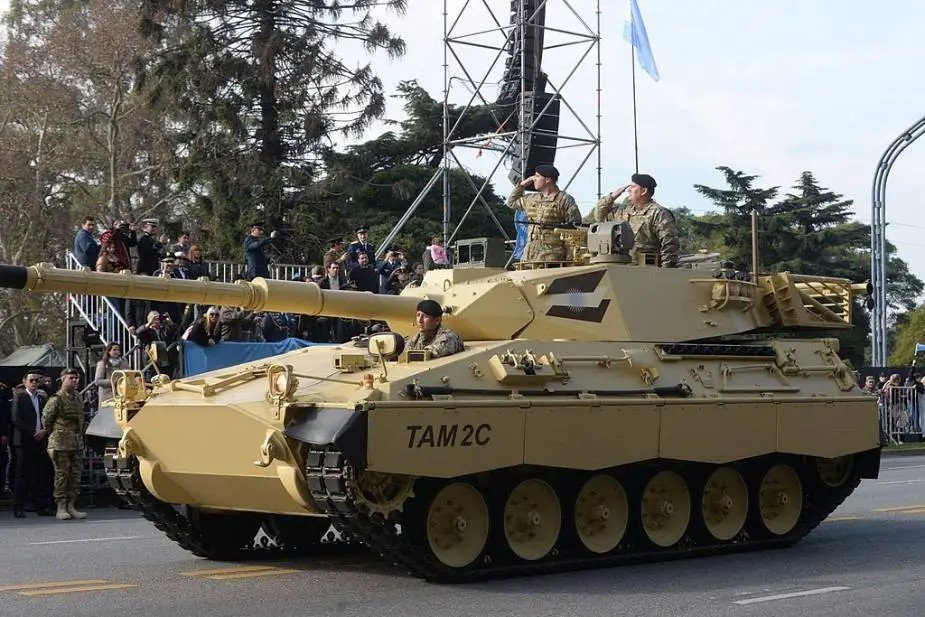
Argentine Defense Minister supervises firing tests of prototype TAM 2CA2 Medium Tank
As reported by InfoDefensa on May 13, Argentinian Minister of Defense, Jorge Taiana, supervised the firing and adjustment tests of the TAM Medium Argentine Tank (TAM, Tanque Argentino Mediano) in its TAM 2CA2 version. These tests were carried out at the Magdalena tank firing range, with the aim of verifying the modernization that involves the integration of new systems. Minister Tiana commented that “We are very satisfied that this modernization is advancing within the deadlines we have established. We hope to end the year with several tanks modernized and ready to integrate the operational units”.
 The TAM 2C project proposes to modernize 74 TAM tanks in five years, with a complementary stage of 30 additional units, estimating that more than 100 tanks will be manufactured in the foreseen time. The army aspires to have received between 10 and 12 tanks by the end of 2023.
The TAM 2C project proposes to modernize 74 TAM tanks in five years, with a complementary stage of 30 additional units, estimating that more than 100 tanks will be manufactured in the foreseen time. The army aspires to have received between 10 and 12 tanks by the end of 2023.
The company Industrias Metalúrgicas Pescarmona Sociedad Anónima (Impsa) was hired to carry out the metal-mechanical part, a company that had already participated in the 80s making the bearings for the tanks, while the optronic instruments will be provided by the Israeli company Elbit Systems.
Designed and produced domestically by the Argentine company TAMSE (Tanque Argentino Mediano Sociedad del Estado), the TAM 2CA2 is a variant of the original TAM (Tanque Argentino Mediano) tank, which was developed in the 1970s.
The TAM 2CA2’s overall dimensions and weight allow for easy transportation and deployment. The tank’s turret is armed with a powerful Rheinmetall Rh-105-30 105mm smoothbore gun manufactured in Argentina as the FM K.4 Modelo 1L. One of the notable features of the TAM 2CA2 is its advanced fire control system, which incorporates modern targeting technologies. This enables the tank to engage targets accurately and efficiently, even on the move. The tank’s onboard computer systems enhance its operational capabilities, providing the crew with vital information and improving overall situational awareness on the battlefield.
The TAM’s engine requirements included low weight and volume, but with a fast rate of acceleration and high reliability. The program chose MTU’s MB-833 Ka 500 diesel engine, producing 540 kW (720 hp) at 2,400 rpm. This gives the TAM a power-to-weight ratio of 24 horsepower per tonne and a maximum speed of 75 km/h (47 mph) on the road and 40 km/h (25 mph) off-road. With a 680-liter (180-U.S.-gallon; 150-imperial-gallon) internal fuel tank, the TAM can travel 500 km (310 mi). Its range is extended to 900 kilometers (560 mi) if the vehicle is equipped with two 200-liter (53 U.S. gal; 44 imp gal) external fuel tanks. The TAM’s transmission is a Renk HSWL-204 automatic, with a hydrodynamic torque converter.
TAM 2C
In 2010, a modernization program was announced. Israeli defense contractor Elbit Systems was chosen to provide 3-axis gyro-stabilization. The first TAM unit upgraded by Elbit Systems was delivered in March 2013. The TAM 2C was upgraded with many features, mainly revolving around electronics and other secondary features. The upgrades included a thermal imager for the gunner and commander, a thermal sleeve for the barrel, and an auxiliary power unit to provide power to critical systems when the main engine is off and reduce fuel consumption while idling. The TAM 2C also had numerous firepower upgrades, including new APFSDS shells and a new HEAT shell, and the capability to fire LAHAT anti-tank guided missiles, with over 800 mm of penetration and 8 km range. It is not known whether or not the Argentinian government will purchase such missiles. The TAM 2C also received a new turret storage basket.
To ensure enhanced protection, the TAM 2CA2 tank is equipped with composite and modular armor, offering improved resistance against various threats, including anti-tank projectiles and explosive devices. The tank’s armor is further complemented by an advanced self-protection suite, which includes smoke grenade launchers and anti-missile countermeasures, providing the crew with enhanced survivability.


